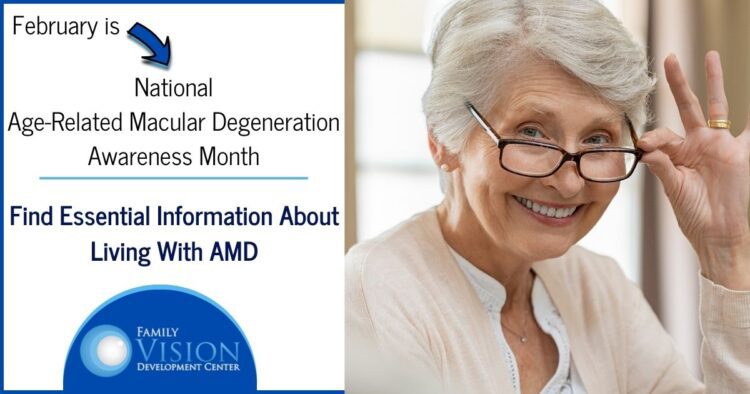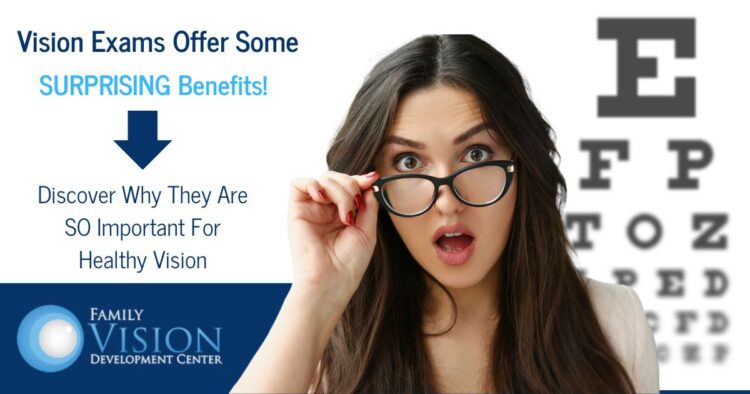

AMD Awareness: Expert Facts & Guidance to Manage this Condition
February marks National Age-Related Macular Degeneration (AMD) Month, a time dedicated to raising awareness about this prevalent eye condition. At Family Vision Development Center, we believe it’s crucial to inform our patients about AMD, its risk factors, symptoms, and management strategies. Therefore, we would like to share some important information about the basics of AMD and explore how we can assist in managing this condition effectively.
What is Age-Related Macular Degeneration (AMD)?
AMD is a progressive eye disease that affects the macula, the central part of the retina responsible for sharp, central vision. Over time, AMD can lead to blurred or distorted vision, making it challenging to perform tasks such as reading or driving.
Types of AMD
- Dry AMD: This form of AMD is more common, characterized by the gradual breakdown of light-sensitive cells in the macula.
- Wet AMD: Less common but more severe, wet AMD involves the growth of abnormal blood vessels beneath the macula, which can leak blood and fluid, leading to rapid vision loss if left untreated.
Risk Factors for AMD
- Age: AMD primarily affects individuals over the age of 50.
- Family History: Genetics play a significant role in predisposing individuals to AMD.
- Smoking: Tobacco use increases the risk and progression of AMD.
- Obesity: Being overweight or obese is associated with a higher likelihood of developing AMD.
- High Blood Pressure: Hypertension can contribute to the progression of AMD.
- Sun Exposure: Prolonged exposure to ultraviolet (UV) light may increase the risk of AMD.
Symptoms of AMD
- Gradual loss of central vision
- Distorted or blurry vision
- Difficulty reading or recognizing faces
- Increased sensitivity to glare
- Decreased color perception
How Family Vision Development Center Can Help Manage AMD
- Comprehensive Eye Examinations: Regular eye exams are crucial for early detection and monitoring of AMD. During your exam, we will perform various tests, including visual acuity tests, dilated eye exams, and imaging tests, to assess the health of your retina.
- Personalized Treatment Plans: Depending on the type and severity of AMD, we may recommend specific treatments, such as:
- Nutritional supplements containing vitamins and minerals beneficial for eye health.
- Anti-VEGF (vascular endothelial growth factor) injections to inhibit the growth of abnormal blood vessels in wet AMD.
- Low vision aids and devices to help improve visual function and quality of life for individuals with advanced AMD.
Treatment options for both wet and dry AMD are continually changing and improving, such as evolving drug therapies, gene therapy for wet AMD, advancing anti-VEGF treatments, and even stem cell transplants. We stay informed of developments as they become available and work with patients to determine the best course of treatment.
- Lifestyle Modifications: Another way we help our patients is by providing guidance on lifestyle changes that may help manage AMD and reduce its progression. This may include quitting smoking, maintaining a healthy diet rich in antioxidants and omega-3 fatty acids, wearing UV-protective sunglasses, and managing underlying health conditions like hypertension.
- Patient Education and Support: Of course, we will always serve as a valuable resource for educating our patients about AMD, answering questions, and providing support throughout their treatment journey. We do our best to offer advice on adapting daily activities to accommodate changes in vision, and refer patients to support groups or other services if needed.
As we observe National Age-Related Macular Degeneration Month, it’s essential to prioritize eye health and raise awareness about AMD. By understanding the risk factors, symptoms, and management options for AMD, our patients can take proactive steps to preserve their vision. Your eye doctor plays a crucial role in diagnosing, treating, and supporting individuals affected by AMD, so don’t hesitate to contact us at 630-862-2020 to schedule your regular eye exam and seek guidance for optimal eye care.
Family Vision Development Center is a full-service vision center offering innovative vision therapy services, sports vision therapy services, post-concussive vision rehabilitation, comprehensive vision exams for eyeglasses and contact lenses, management of ocular diseases including glaucoma, diabetes, macular degeneration and cataracts, and a state-of-the-art optical center offering the latest designs in eyewear.

